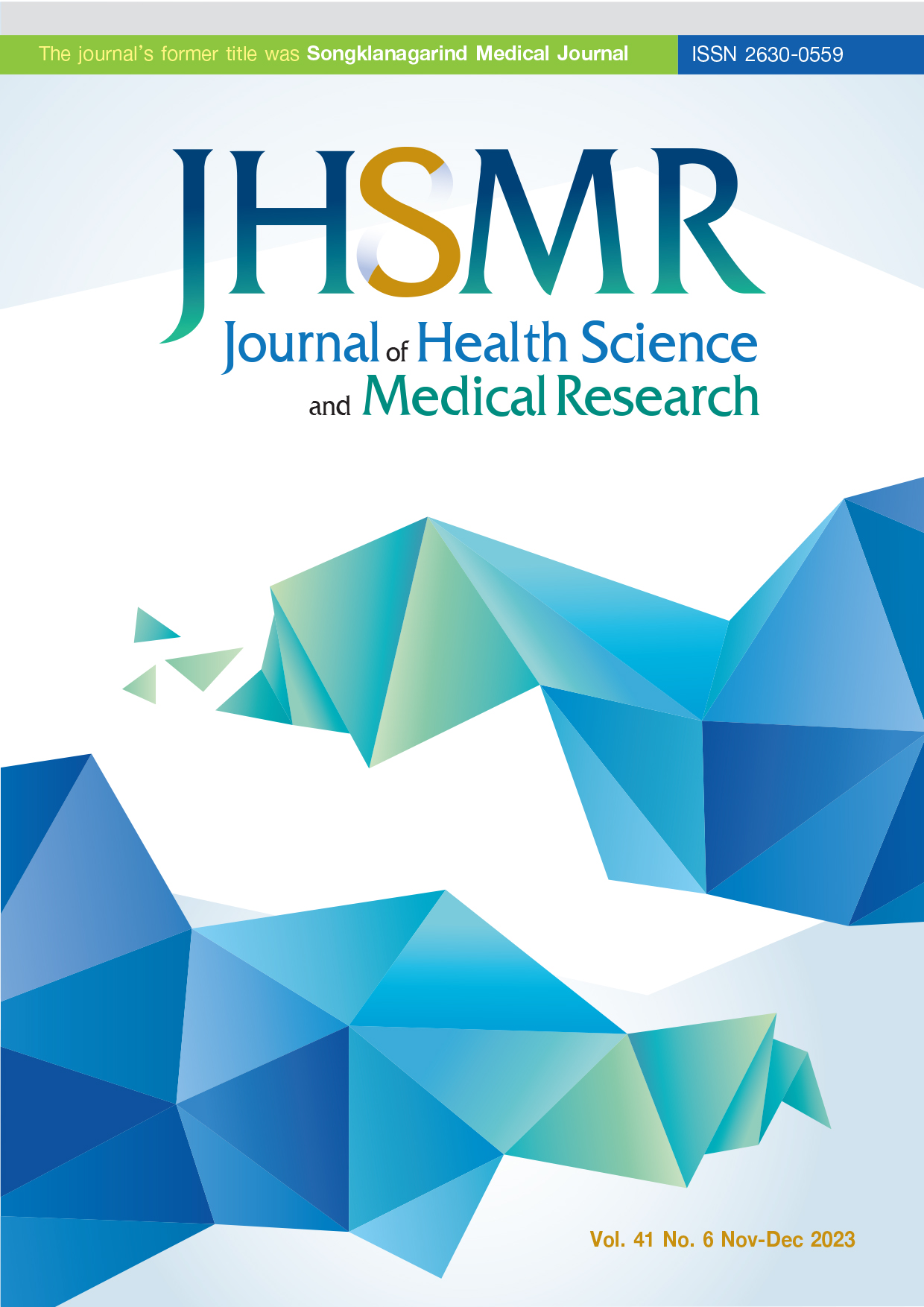Concordance of the Thai versions of the Patient Health Questionnaire and Edinburgh Post-natal Depression Scale for Antenatal Depression
DOI:
https://doi.org/10.31584/jhsmr.2023985Keywords:
antenatal screening, depression, Edinburgh Postnatal Depressin Scale, Patient Health QuestionnaireAbstract
Objective: To compare the Thai versions of the Patient Health Questionnaire (PHQ-9) and the Edinburgh Postnatal Depression Scale (EPDS) and examine the associated factors with the degree of concordance for assessing depression in pregnant Thai women.
Material and Methods: This was a cross-sectional study conducted in November-December 2022. The Thai versions of both the PHQ-9 and EPDS were completed by pregnant women at the Antenatal Care Clinic, Songklanagarind Hospital, Thailand. Descriptive data analysis and multivariate logistic regression were performed using The R Program to categorize “normal” and “increased risk of antenatal depression” and examine the statistical agreement, associated factors, and concordance between the two tools.
Results: Of the 135 pregnant Thai women enrolled in the study, most lived in non-restive areas of southern Thailand (80.7%) with a mean age of 31.7 years. Most participants were found “normal” for antenatal depression screening by the Thai versions of both the PHQ-9 and the EPDS (89.6% and 88.9%, respectively). Complete concordance between the PHQ-9 and EPDS tests was found in 122 of the women, with 84.4% of all women found ‘normal’ and 5.9% found to have “increased risk of antenatal depression” with both questionnaires. The overall agreement between the 2 questionnaires was statistically significant (Kappa=0.4979, p-value<0.0001, Z=5.79). The statistical analysis identified no demographic factors associated with the concordance.
Conclusion: The Thai versions of the PHQ-9 and the EPDS for antenatal depression screening had significantly moderate agreement. The statistical analysis found no factors associated with the concordance.
References
World Health Organization. Depression: let’s talk [homepage on the Internet]. Geneva: WHO; 2019 [cited 2023 Feb 23]. Available from: https://www.who.int/mentalhealth/management/depression/en/
Dadi AF, Miller ER, Bisetegn TA, Mwanri L. Global burden of antenatal depression and its association with adverse birth outcomes: an umbrella review. BMC Public Health 2020;20:173.
Gelaye B, Rondon MB, Araya R, Williams MA. Epidemiology of maternal depression, risk factors, and child outcomes in low-income and middle-income countries. Lancet Psychiatry 2016;3:973-82.
Choosuk P, Pitanupong J, Suwanrath C. Prevalence and factors associated with antepartum depression: a university hospitalbased. Siriraj Med J 2021;73:652–60.
Tuksanawes P, Kaewkiattikun K, Kerdcharoen N. Prevalence and associated factors of antenatal depressive symptoms in pregnant women living in an Urban area of Thailand. Int J Womens Health 2020;12:849-58.
Ross R, Sawatphanit W, Zeller R. Depressive symptoms among HIV-positive pregnant women in Thailand. J Nurs Scholarsh 2009;41:344-50.
Lotrakul M, Sumrithe S, Saipanish R. Reliability and validity of the Thai version of the PHQ-9. BMC Psychiatry 2008;8:46.
Carroll HA, Hook K, Perez OFR, Denckla C, Vince CC, Ghebrehiwet S, et al. Establishing reliability and validity for mental health screening instruments in resourceconstrained settings: systematic review of the PHQ-9 and key recommendations. Psychiatry Res 2020;291:113236.
Murray AL, Hemady CL, Do H, Dunne M, Foley S, Osafo J, et al. Measuring antenatal depressive symptoms across the world: a validation and cross-country invariance analysis of the Patient Health Questionnaire-9 (PHQ-9) in eight diverse low-resource settings. Psychol Assess 2022;34:993-1007.
Dajpratham P, Pukrittayakamee P, Atsariyasing W, Wannarit K, Boonhong J, Pongpirul K. The validity and reliability of the PHQ-9 in screening for post-stroke depression. BMC Psychiatry 2020;20:291.
Flanagan T, Avalos LA. Perinatal obstetric office depression screening and treatment. Obstet Gynecol 2016;127:911–5.
Ransing R, Deshpande SN, Shete SR, Patil I, Kukreti P, Raghuveer P, et al. Assessing antenatal depression in primary care with the PHQ-2 and PHQ-9: can it be carried out by auxiliary nurse midwife (ANM)? Asian J Psychiatr 2020;53:102109.
Zhong Q, Gelaye B, Rondon M, Sanchez SE, Garcia PJ, Sanchez E, et al. Comparative performance of Patient Health Questionnaire-9 and Edinburgh Postnatal Depression Scale for screening antepartum depression. J Affect Disord 2014;162:1-7.
Santos IS, Matijasevich A, Tavares BF, da Cruz Lima AC, Riegel RE, Lopes BC. Comparing validity of Edinburgh scale and SRQ20 in screening for post-partum depression. Clin Pract Epidemiol Ment Health 2007;3:18.
Levis B, Negeri Z, Sun Y, Benedetti A, Thombs BD, Group DESDE. Accuracy of the Edinburgh Postnatal Depression Scale (EPDS) for screening to detect major depression among pregnant and postpartum women: systematic review and metaanalysis of individual participant data. BMJ 2020;371:m4022.
Roomruangwong C, Withayavanitchai S, Maes M. Antenatal and postnatal risk factors of postpartum depression symptoms in Thai women: a case-control study. Sex Reprod Healthc 2016;10:25-31.
Boobpamala S, Netimetee S, Jindapaisan S. Depression prevention in pregnant adolescents. Thai J Nurs 2022;71:63–72.
Mao F, Sun Y, Wang J, Huang Y, Lu Y, Cao F. Sensitivity to change and minimal clinically important difference of Edinburgh postnatal depression scale. Asian J Psychiatr 2021;66:102873.
Wang L, Kroenke K, Stump TE, Monahan PO. Screening for perinatal depression with the Patient Health Questionnaire depression scale (PHQ-9): a systematic review and metaanalysis. Gen Hosp Psychiatry 2021;68:74-82.
Bluett-Duncan M, Kishore MT, Patil DM, Satyanarayana VA, Sharp H. A systematic review of the association between perinatal depression and cognitive development in infancy in low and middle-income countries. PLoS One 2021;16:e0253790.
Limlomwongse N, Liabsuetrakul T. Cohort study of depressive moods in Thai women during late pregnancy and 6-8 weeks of postpartum using the Edinburgh Postnatal Depression Scale (EPDS). Arch Womens Ment Health 2006;9:131-8.
Yawn BP, Pace W, Wollan PC, Bertram S, Kurland M, Graham D, et al. Concordance of Edinburgh Postnatal Depression Scale (EPDS) and Patient Health Questionnaire (PHQ-9) to assess increased risk of depression among postpartum women. J Am Board Fam Med 2009;22:483-91.
Uthaipaisanwong A, Rungruxsirivorn T, Roomruangwong C, Taechakraichana N, Chaithongwongwatthana S. Associated factors of prenatal depression among teenage pregnant women at King Chulalongkorn Memorial Hospital. J Med Assoc Thai 2015;98:437–43.
Downloads
Published
How to Cite
Issue
Section
License

This work is licensed under a Creative Commons Attribution-NonCommercial-NoDerivatives 4.0 International License.
























